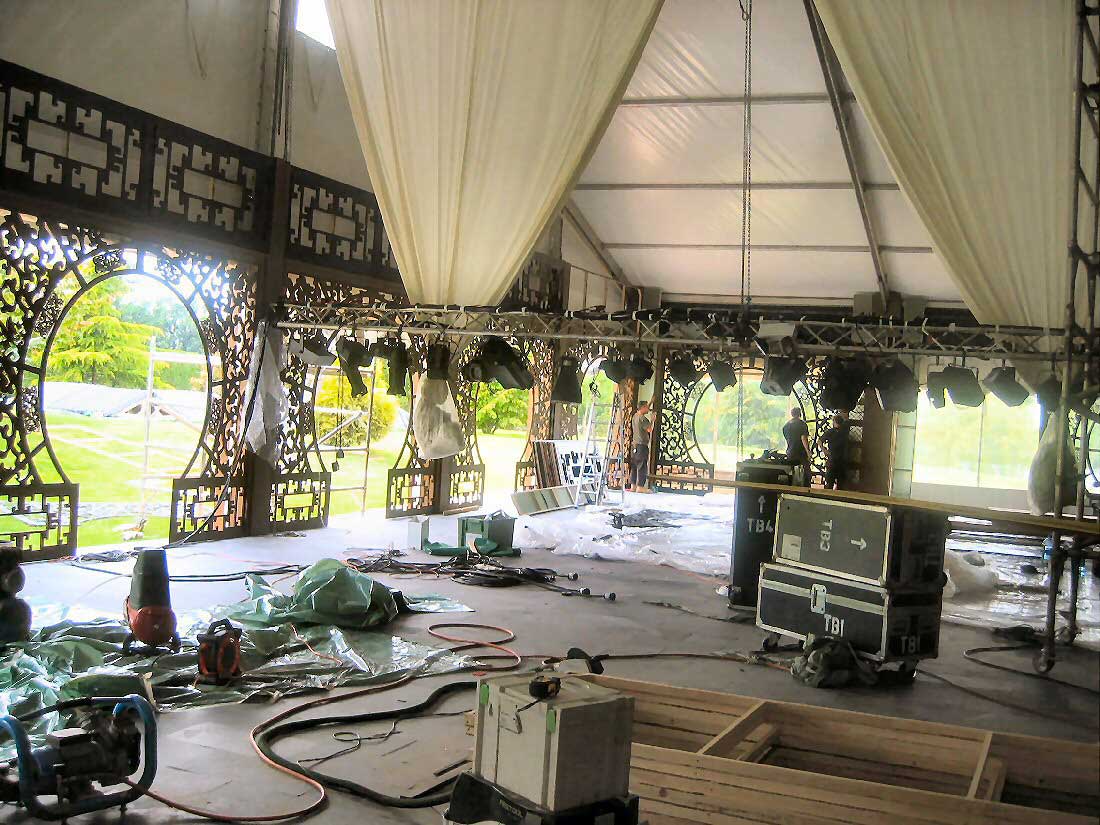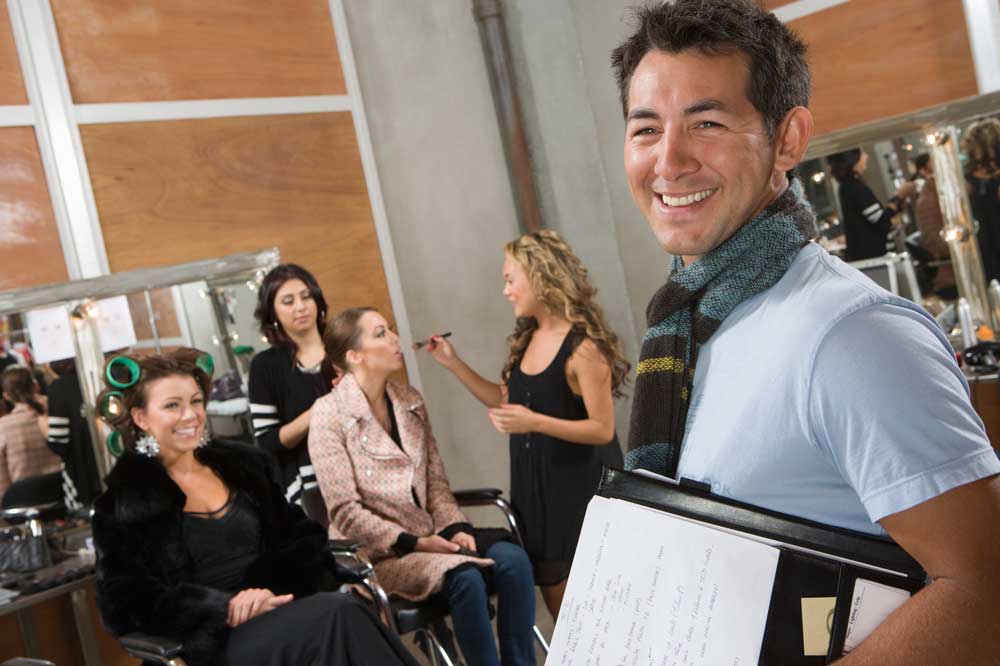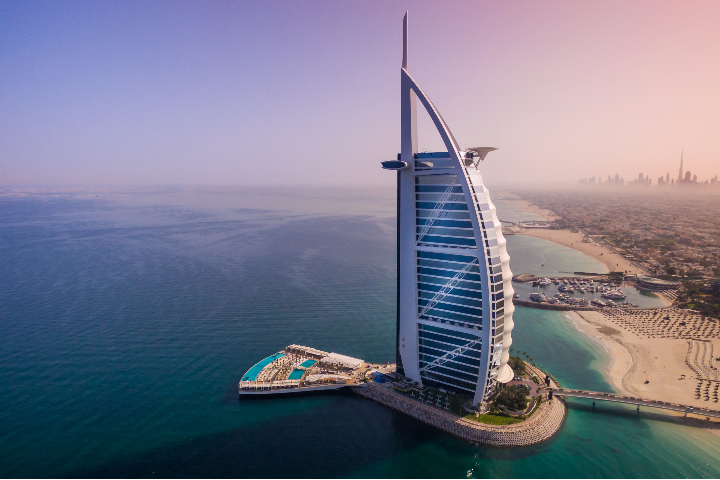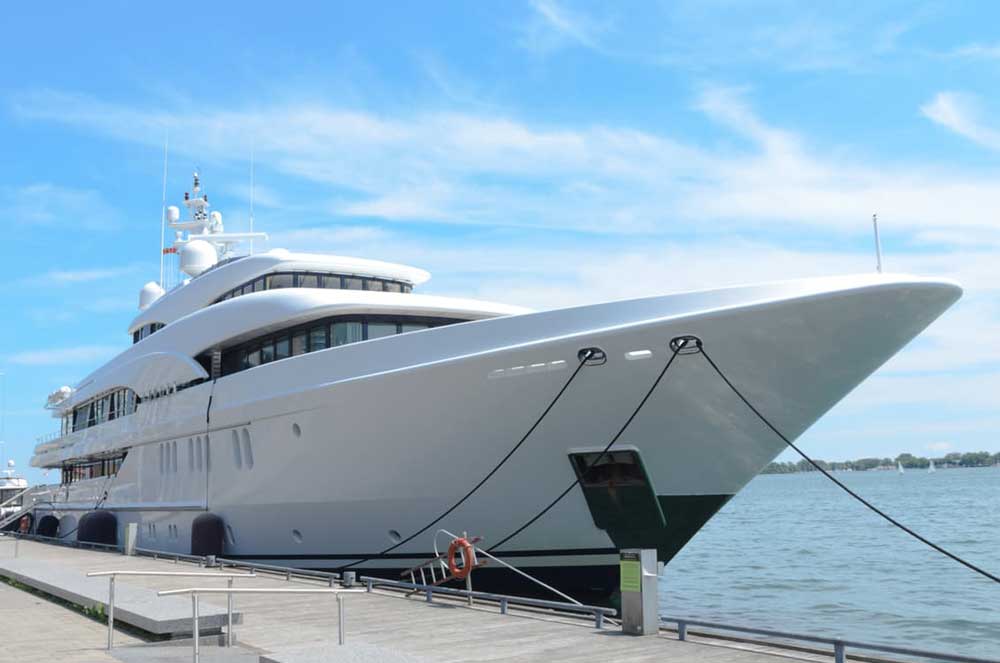For the purpose of this article, we'll use the title of 'Event Co-ordinator' or 'Event Manager' to refer to the roles, responsibilities, and duties performed by onsite event staff—in order to distinguish these from the event planner's job description from the previous article, which dealt with the office-based pre-event planning stage of the process.
However, it's worth noting that the title of Event Co-ordinator is sometimes used to describe a junior office-based planner—also known as an Events Assistant—who supports the lead event planner.
Following the pre-event planning stage, the lead event planner will typically allocate different members of their team or freelance event managers / onsite event co-ordinators to supervise one or more areas of the event.
Below are some of the roles that make up an onsite event co-ordinator's job description during the set-up, live event, and de-rig stages.

Early on in your career, before you become the lead planner, your experience of working onsite is likely to consist of being delegated one or more of these areas to manage.
“During the set-up or load-in for an event, you can have 50–100 people onsite each doing their part. Someone might come in and do the staging and lighting, then the next person comes in and puts the décor on top, then you have the rental companies that bring in the tables and chairs, a décor company that puts the linens on top, then you might work with a florist who puts the centrepieces on. There’s really a lot of detail to be coordinated so that everyone comes in and it all happens like clockwork.”
The first stage of any event is the set up / build stage. For an evening event, this might just be the day of the actual event, but in most cases the build stage consists of one or more days setting up in the venue before the event goes live. This involves all the suppliers loading in and setting up the necessary equipment for the event.
For larger events, there might be a dedicated production manager, operations manager, or site manager to supervise the load in and build. Alternatively, the lead event planner will supervise this process, along with members of their team or freelance onsite event co-ordinators / event managers
During this set up period, an onsite event co-ordinator's job description might first involve checking all deliveries have arrived at the venue and unpacking flight cases of equipment shipped in advance from the event planner's office, before setting up a site office with telecoms and internet services.
Other set up might include registration desks, laptops/tablets/databases for check in, guest lists, signage, displays, branding, ropes and posts, printing name badges, and stuffing information packs, hand outs, and gift bags.

It might also involve setting up a backstage area / dressing room / green room for artists and performers or, in the case of fundraising event, unpacking and setting up auction lots and raffle prizes for display.
There really are any number of things to be set up before the event goes live and each event will have slightly different needs.
“During the event itself, the planner might be behind the scenes in the kitchens overseeing and expediting the food to make sure it’s all getting out on time. Alternatively, they might be backstage making sure the performers are on schedule, or in the garage making sure all the town cars and limos are dropping off at the right place. It’s really easy for the event to fly by and you miss most of it from the guest’s perspective. The planners are there to make sure everything happens when it’s supposed to and the way it’s supposed to.”
Once the event goes live, event co-ordinators / managers will typically be assigned a specific area of the event to manage.
Not all of the roles below will be applicable to every event. For example, travel and hotel related roles are typically more unique to corporate events and meeting planning, although some special events, such as weddings and celebrations, sometimes call for these roles too.
Meeting each guest at the airport and arranging transport to their hotel, or directly to the event itself. As guests arrive on multiple flights, at different times throughout the day and night, sometimes into different terminals, this can involve an event co-ordinator being stationed at the airport from early morning till late at night over one or more days.
Meeting guests at their hotel and overseeing check-in. Like airport duty, this can involve event co-ordinators waiting at a check-in desk all day to process staggered arrivals. Managing check-ins might also involve organizing a ‘room drop’ in advance, so that each guest receives a welcome pack, itinerary, or gift in their room when they arrive. Overseeing 500 room drops, in a tight window between when the room has been serviced and when the guest checks in, can itself be a logistical nightmare.
Co-ordinating transport to and from various different hotels to the event venue and off-site activities. This might start at 7am, with coaches laid on to get guests from their respective hotels to the event venue, and continue right through the day until the early hours of the following morning when the event co-ordinator will have to wait around for the last guests to leave after dinner before you can put them on a coach back to their hotel. At special events this might involve an event co-ordinator managing the valet parking, drop-off, or parking area at both the beginning and end of the event—along with the addition of a taxi desk / marshal to assist people getting home at the end.
Supervising the set up and delivery of all food and beverage during the event—including any seating plans, place settings, and dietary requirements/special meals. Again, this can start with breakfast set-up at 6am and go right through morning and afternoon refreshments, lunch, and cocktails, until the end of the evening dinner. It may also involve overseeing off-site catering at various restaurants and venues. Similarly, at special events and gala dinners, this might involve being based in the kitchens to expedite service of each course or check the presentation of each dish before it leaves. Alternatively, it might mean checking that buffet tables and food stations are regularly re-stocked, clean, and tidy.
Supervising the welcome area and registration of each guest on arrival at the event, issuing name badges, or managing the various break-out rooms surrounding the main meeting/conference that are used for smaller meetings, talks, and one-on-one sessions. Checking in 3,000 delegates requires a lot of smiling! At special events this might involve supervising the guest list and ticketing, entrance security, VIP arrivals and press line up / red carpet, and managing the flow through the arrivals area to avoid congestion.
Managing the arrival and departure of guest speakers and the delivery of their presentations. You may have a speaker whose flight gets delayed, meaning you have to contact all the other speakers to change the running order at the last minute. That, or they’ll want to "just add a few slides to the presentation" five minutes before they’re due to speak. Or swap their lapel microphone for a lectern microphone. Or have a laptop on stage to use PowerPoint’s ‘presenter view.’ The list goes on… At special events this might involve an event co-ordinator managing the arrival and departure of artists and performers—sometimes headline acts—including parking/travel home, sound checks and rehearsals, dressing rooms, hair and make up facilities, toilets and showers, riders, backstage catering, green rooms, and ensuring they get to the stage at the right time!
Supervising the main room set-up, including the room layout, seating, staging, AV requirements, decor, tables and centrepieces, bars and service stations, heating/cooling, and the distribution of any conference folders and handouts—or in the case of special events, printed menus, event programs, auction catalogues, and table gifts.
Supervising on-and off-site activities and excursions—anything from golf and spa days to beach bonfire parties and swimming with dolphins. This might include arranging tickets/passes, transport, catering, or equipment hire. Sometimes you get to take part too!
Now that we've looked at the roles, duties, and responsibilities that make up an event co-ordinator job description, let's look at what it's really like to work onsite as an event co-ordinator / manager.
Being onsite at an event can be quite exciting, but it’s often far from glamorous and incredibly hard work. It may well be a very glamorous or high profile event, but you probably won’t have time to appreciate that.
For a start, the working conditions onsite for staff can sometimes be pretty poor. Most of the time I’m lucky if I even get to eat during the event—and even then, it’s usually a basic crew meal (not the same food that the guests eat!) wolfed down while standing up or, at best, leaning against a flight case backstage.

I used to organize an annual event for The British Red Cross, which was held in a tent in winter. As it was an enormous tent, it would have cost a fortune in generator fuel to heat it continuously for the three-day set-up period prior to the event—plus with suppliers loading in, doors were always open, so there would be no way to keep the heat in anyway.
For three days, we had to set-up in the freezing cold wearing gloves, scarves, hats, and huge coats—indoors. It was literally like working outdoors in winter, doing 15-hour days. Not something you might associate with luxurious special events.
“I think anyone wanting to get into the events industry should be aware of the long hours involved. Onsite, you might perhaps be able to grab a hors d'oeuvre as a tray goes past but other than that, it’s non-stop work with little or no time for breaks. Very often, we would start at 8 a.m. and not finish until 3 a.m. the following morning—then we’d have to be at the office at 9 a.m.”
An event co-ordinator's hours are also incredibly long; you often have to arrive onsite very early in the morning, say 6am, in order to maximize a whole day of set-up time before the guests arrive. You then work through the day, into the evening, and then once the guests have gone home you have to clear up—which can often continue right through the night.
Until you experience it, it’s pretty hard to describe the deflated feeling you get at the end of an event when you’re exhausted, your feet are swollen because you haven’t sat down for 15 hours, and everyone else has gone home; the guests, the clients, the suppliers, sometimes even the rest of your team. Yet you’re the one who has to stick around packing up boxes, extinguishing candles, or carrying heavy crates of leftover champagne to a safe storage area because the caterers forgot to.
You might leave at 3am if you’re lucky, only to be back onsite at 7am to finish the de-rig and load all the equipment out. This is something that people often forget about event planning. Not only are there late nights, but these are usually followed by early starts, as you have to clear up and load out of the venue so that it’s ready for the next event.
“Onsite, we start at about 6 am every day—for breakfast at 7 am—and events, like the awards, can go right through until 11 pm—so the event planner is around even later than that. Each day is long, and it’s tough on the feet! There’s no doubt that coming down off an event is tough; it’s basically a 50-hour week crammed into three days. But if you have a good team, it’s a lot of fun.”
There’s also a customer-service element to the job when working onsite and the guests can be a real pain sometimes—especially after a few drinks. As an event co-ordinator, you've really got to be able to think on your feet and be able to deal with almost any situation in a calm and diplomatic manner without panicking.
I’ve had to deal with investments bankers getting into fistfights after too many drinks, a wealthy woman demanding that the £3,000 dress on loan from a designer be paid for because a waiter had stepped on the train, and a guest insisting a cloakroom attendant had lost £30,000 worth of jewelry that she’d supposedly checked-in inside her bag.
I’ve had to handle drunk guests having sex in bushes in full view of everyone else, guests trying to steal raffle prizes from a table at a charity event, guests trying to walk out with fixtures and fitting, and guests demanding three extra gift bags “for their kids” at a charity fundraiser.

Not to mention a man who had a heart attack, an elderly woman who evacuated her bowels while wearing a very expensive ball gown, and a well-known fashion designer with an explosive temper only informing me that she was on a low-sodium diet after being presented with her main course of salt-baked sea bass.
The truth is there are usually so many things to deal with onsite at events, that an event planner spends most of their time running from one situation to another, so they often miss most of the event as seen from the audience’s perspective. Instead of gawping at celebrities or watching headline acts, the event planner is busy trying to find out why the air conditioning has stopped working, why the guest speaker has disappeared two minutes before he’s due on stage, and why the transport to take the VIP guests home hasn’t turned up. That’s the reality of onsite event co-ordination.
“There are always issues that come up onsite, so the producer is really there to problem solve. If you’re the executive producer, you’re in charge of the whole thing, so you’ll have a team in place that is activating the program onsite. You’re there overseeing and making sure that every little thing that you’ve done in pre-production is occurring on-site. Something unforeseen will always come up that you haven’t prepared for, so you need to be able to deal with that.”
One of the great things about working in event planning, especially corporates events and meetings, is that there’s often a lot of travel involved—which is definitely one of the perks of the job. You get to fly to foreign countries at the client’s expense and stay in luxury hotels for a week. Not only do you get to work on an exciting event but you also get to travel and see different cities—with all your flights, accommodation, and meals paid for.
Well, sometimes the reality is a little different unfortunately.
When I worked in the corporate events department of the investment bank Credit Suisse, members of the team would often work as onsite event co-ordinators at each others events in order to support the lead planner. We’d often travel to amazing places such as Barcelona, Spain, in the summer, and luxury ski resorts such as G’Staad and St Moritz, Switzerland, in the winter months. Which sounds glamorous.

The truth, however, is that you work your butt off when you’re there, often putting in 15-hour days. Sometimes there’s no free time to get out and see the city, and on the rare occasion there is, you’re usually so exhausted and sleep-deprived that you’d rather just order room service, take a hot bath, and then fall into bed for a good night’s sleep. Most of the time you’re holed up in a windowless hotel ballroom, so you really could be anywhere in the world. You go from airport to venue back to airport. Sometimes you don’t even get to stay in the same 5 Star luxurious hotels as the guests—you’re packed off to a cheaper 2 Star hotel for all the staff.
I’ve even known of event staff being flown from London to Buenos Aires (average flight time 14 hours) in coach, then because they’ve landed during the day local time, they’ve been expected to go straight to work and help set up at the venue.
“You have got to understand what event planning is really all about. You’re not going to be sitting on a flight going to a 5 Star hotel having a lovely time. You might be on a flight sometimes, but it will be late at night, after a full day in the office, you’ll be tired, hungry, and your feet will hurt. It involves long hours; you’ve got to give up your weekends sometimes, evenings often, and you don’t get paid extra for that, it’s just part of what we do.”
The other thing to remember is that each of the onsite roles outlined above comes with their own set of drawbacks....
At one event in Barcelona that I worked as an event co-ordinator, my role was to supervise the guest’s airport arrivals and ensure they transferred safely to the hotel. For two days, while it was glorious sunshine outside and all my colleagues were telling me that Madonna was staying in our hotel, I was stationed at an arrivals desk inside the airport (airside so I couldn’t even go in and out without passing through security) from 6.30am to 10pm waiting for planes to arrive. I’d have to patiently smile at hundreds of demanding investment bankers who’d talk down to me as I tried to co-ordinate a continuous rotation of mini buses and taxis (the drivers of which only spoke Spanish) to pull up outside the airport—where they couldn’t park—to shuttle them to their hotels.
Not only was it mind-numbingly boring hanging around for hours in between flights, the only company I had was a team of support staff from a local DMC (Destination Management Company) who spent the entire time speaking to each other in Catalan so that I couldn’t understand what they were saying. It was a very long three days.

At another event in G’Staad, I was allocated food & beverage duties, which means getting up at 5am to supervise breakfast.
Then of course, you’re the last one to leave at the end of the day following the evening dinner. And when I say the end of the day, it’s actually the early hours of the following morning—because when executives are away at a conference, on the company dime, and there’s an evening dinner involved, they’re in no hurry to go to bed.
They just keep ordering more wine, then cognacs, then coffee, then cigars etc. Which, as the event planner, you stand around and watch them do, before making sure they get the right transport back to their hotel. Then you finally get back to your room around 2am, if you’re lucky, and set your alarm for 5am to start all over again.
I remember getting to bed at 1am one night, really excited that I was going to get a full four hours sleep, only to be woken by one of the guests—an investment banker, naturally—insisting that I call an emergency doctor to come out in the middle of the night. Which of course I arranged, fearing it might be serious, only to later find out the guest was diagnosed with indigestion, brought on by the copious amounts of cheese fondue he’d consumed at dinner. I think I maybe got an hour’s sleep that night.
Fortunately, it’s not always like that. If you’re onsite for a day or two before the guests arrive, then there’s often time to grab an evening meal out in a local restaurant with the rest of the team—or there might be a team night out on the final evening once all the guests have gone. I’ve even worked on meetings and conferences in Ski resorts where the event co-ordinators have packed the guests off home after breakfast and spent the rest of the day on the slopes!
“When it comes to going onsite, we assign different members of the team—or freelance event managers—to oversee each of the different areas of the event, such as transportation, food & beverage, entertainment & activities etc. What you don’t do—ever—is relinquish responsibility to the suppliers that you work with. You need to manage them and your expectations, so there’s a huge amount of things to balance on-site.”
Although event planning is not always as glamorous as it might seem from the outside, it’s still undoubtedly a very unique, exciting, and rewarding career—and you can have a lot of fun on the job.
Despite the endless Excel spreadsheets, boring health and safety paperwork, and 15-hour days hanging around at airports, event planning is an amazing job unlike most others.
The chances are you will end up travelling to exciting locations, staying in fancy hotels, working with incredibly talented people, meeting celebrities, sampling fine food and wine, getting VIP access to places, being the first to adopt new trends and technologies, and generally being given unique opportunities that most people just never get to experience—all as part of your job!

“Obviously I originally started in a junior role at another company. It was hard work, it wasn’t highly paid, it was stressful, and sometimes I’d think ‘wow I get paid very little for doing so much.’ But then I’d look at what my friends were doing, and how boring their jobs were, and I’d realize that my job was pretty fantastic because I got to go to lots of places, do site visits around the country, go to food tastings, travel abroad, and meet interesting people.”

In the next section, Your Career in Event Planning, we'll hear other event professionals describe some the most unique, fun, and rewarding experiences that they’ve had being an event co-ordinator / planner.
These range from the superficial; chartering luxury yachts, visiting private rooms at Windsor Castle [an official residence of The Queen of England], meeting Presidents and working with the Secret Service, to the profound; creating unforgettable experiences for clients/guests, and forming deep friendships by working onsite as part of team.
That's not to mention the ultimate reward that every planner gets; the adrenaline rush of working in a live environment, the thrill of seeing your work come to life, and the reaction on guests’ faces.
What you need to know about event planning careers; how to decide what type of event planner you want to be, the different ways to work as an event planner, the pros and cons of careers in event planning, the benefits of being an event planner, what it takes to be an event planner, and what it is like to be an event planner—with anecdotes and insights from professional event planners.